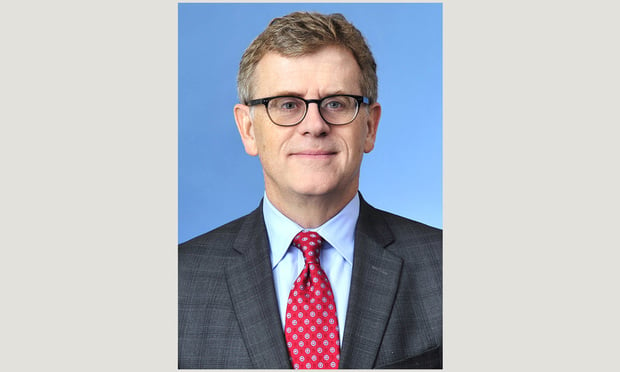Thank You, Gino—An Invaluable Asset to the Seventh Circ. Who Will Be Missed
It is certainly true that judicial comings and goings affect the development of the law. A new administration, new laws or rules, or the retirement or appointment of a particular judge can shape the law, for better or ill. Yet the experience of practicing in a court depends on a variety of other people that we should notice and recognize.
January 15, 2020 at 10:16 AM
5 minute read
 Michael T. Brody, co-chair of Jenner & Block.
Michael T. Brody, co-chair of Jenner & Block.
With 2019 behind us, there is a natural tendency to reflect on the past, to take stock of where things stand, and to contemplate the future. In our professional lives, that may mean acknowledging clients, reliving successes and failures, and making plans for the year to come. In columns such as this, reflecting on the year gone by usually means addressing changes in the composition of the courts, noteworthy decisions or cases awaiting decision.
 Focusing on those "big picture" ideas neglects the fact that the operation of the courts in which we appear depends on public servants who work every day to ensure that things go smoothly and cases move forward. It is certainly true that judicial comings and goings affect the development of the law. A new administration, new laws or rules, or the retirement or appointment of a particular judge can shape the law, for better or ill. Yet the experience of practicing in a court depends on a variety of other people that we should notice and recognize.
Focusing on those "big picture" ideas neglects the fact that the operation of the courts in which we appear depends on public servants who work every day to ensure that things go smoothly and cases move forward. It is certainly true that judicial comings and goings affect the development of the law. A new administration, new laws or rules, or the retirement or appointment of a particular judge can shape the law, for better or ill. Yet the experience of practicing in a court depends on a variety of other people that we should notice and recognize.
Gino Agnello is one of those people. He has served as the clerk of the U.S. Court of Appeals for the Seventh Circuit since 1997. Before he was the clerk of the court, he was deputy circuit executive. After a career of public service, Agnello retired at the end of 2019. For the past 30 years, Agnello has improved the quality of the administration of justice and the relationship between bench and bar throughout the Seventh Circuit. Though not one to draw attention to himself, and often invisible even to experienced practitioners, Agnello has been the keystone to the smooth operation of the court. While the circuit is engaged in hiring a new clerk, it will be hard to find someone to fill his shoes. This article looks back on some of the things that Agnello accomplished during his tenure as clerk of the Seventh Circuit and how important he was to lawyers who practice in that court.
Practitioners in the Seventh Circuit know that the office of the clerk of the court is exceptionally well run. Filings are handled smoothly, arguments are scheduled promptly, and the work of the court is completed without delay. While Agnello is quick to remind that there is no such thing as "clerkal estoppel" and guidance from the Clerk's Office will not excuse a failure to follow the rules, the office he supervises publishes clear guidance on rules and procedures.
Beyond that, throughout Agnello's tenure as clerk, the court has seamlessly evolved with advances in technology. While many of these innovations are now commonly used in other courts across the country, under Agnello's leadership the Seventh Circuit took the lead. He established a real-time RSS feed to make opinions and nonpublished orders immediately available; he saw to it that oral argument recordings are available for review within minutes of the completion of the day's arguments; he managed the court's seamless transition to electronic filing before many other circuits; and under his direction the court's website is robust, current and easy to navigate. As the Seventh Circuit joined other courts by adopting rules to permit video recordings of selected arguments, Agnello made sure that the process was done smoothly.
Along with the chief judges under whom he served, Agnello managed the clerk's office to weather even the unexpected. Through actual and threatened government shutdowns, the Seventh Circuit's clerk's office always remained open. By economizing on allocated funds, Agnello and the court minimized the impact on attorneys, parties and the public. More importantly, he saw to it that the skilled staff of the clerk's office were protected from financial disruption. He made arrangements to minimize the burden on his staff, to whom he was loyal.
In addition to running an efficient staff and operation, Agnello volunteered his services to the bar. He participated in CLE programs designed to demystify what happens behind the counter at the clerk's office and to assist counsel in navigating the process of taking an appeal from beginning to end. He attended quarterly meetings and activities of the Seventh Circuit Bar Association. Agnello volunteered to perform these tasks and advanced the administration of justice across the circuit. Agnello also gave an annual report to the bar on the business of the court at the joint annual meeting of the Seventh Circuit Judicial Conference and the Seventh Circuit Bar Association. His animated PowerPoints, and his droll sense of humor, brought life to an otherwise detailed presentation on judicial filings and dispositions.
Agnello also honored and carried forward the legacy of the court. He remembered and spoke of the judges who had retired or passed away. He was fond of the circuit's long-serving circuit Justice, John Paul Stevens. Not long before Stevens' death, Agnello traveled to Florida to interview retired Stevens for a bar association program and joined the justice in a swim in the surf.
Throughout his tenure, Agnello provided valued service to the court, to litigants, to counsel and to the public. In a stressful environment, he has always done so with grace. He will be missed.
Let us start the New Year by taking note of, and thanking, all of those people who, like Gino Agnello, make our law practices possible and enjoyable.
Michael T. Brody is a partner at Jenner & Block. Brody serves as co-chair of the firm's appellate and Supreme Court practice and co-chair of its class action practice.
This content has been archived. It is available through our partners, LexisNexis® and Bloomberg Law.
To view this content, please continue to their sites.
Not a Lexis Subscriber?
Subscribe Now
Not a Bloomberg Law Subscriber?
Subscribe Now
NOT FOR REPRINT
© 2025 ALM Global, LLC, All Rights Reserved. Request academic re-use from www.copyright.com. All other uses, submit a request to [email protected]. For more information visit Asset & Logo Licensing.
You Might Like
View All
Apple Files Appeal to DC Circuit Aiming to Intervene in Google Search Monopoly Case
3 minute read
A Plan Is Brewing to Limit Big-Dollar Suits in Georgia—and Lawyers Have Mixed Feelings
10 minute read
Trending Stories
- 1Pearl Cohen Enters San Francisco Market Via Combination With IP Boutique
- 2'Incredibly Complicated'? Antitrust Litigators Identify Pros and Cons of Proposed One Agency Act
- 3'A Warning Shot to Board Rooms': DOJ Decision to Fight $14B Tech Merger May Be Bad Omen for Industry
- 4Securities Action Targeting Polestar Alleges Mistakes in SEC Filings
- 5Conspiracy Suits Against Quinn Emanuel, Roc Nation Moved to Federal District Court
Who Got The Work
J. Brugh Lower of Gibbons has entered an appearance for industrial equipment supplier Devco Corporation in a pending trademark infringement lawsuit. The suit, accusing the defendant of selling knock-off Graco products, was filed Dec. 18 in New Jersey District Court by Rivkin Radler on behalf of Graco Inc. and Graco Minnesota. The case, assigned to U.S. District Judge Zahid N. Quraishi, is 3:24-cv-11294, Graco Inc. et al v. Devco Corporation.
Who Got The Work
Rebecca Maller-Stein and Kent A. Yalowitz of Arnold & Porter Kaye Scholer have entered their appearances for Hanaco Venture Capital and its executives, Lior Prosor and David Frankel, in a pending securities lawsuit. The action, filed on Dec. 24 in New York Southern District Court by Zell, Aron & Co. on behalf of Goldeneye Advisors, accuses the defendants of negligently and fraudulently managing the plaintiff's $1 million investment. The case, assigned to U.S. District Judge Vernon S. Broderick, is 1:24-cv-09918, Goldeneye Advisors, LLC v. Hanaco Venture Capital, Ltd. et al.
Who Got The Work
Attorneys from A&O Shearman has stepped in as defense counsel for Toronto-Dominion Bank and other defendants in a pending securities class action. The suit, filed Dec. 11 in New York Southern District Court by Bleichmar Fonti & Auld, accuses the defendants of concealing the bank's 'pervasive' deficiencies in regards to its compliance with the Bank Secrecy Act and the quality of its anti-money laundering controls. The case, assigned to U.S. District Judge Arun Subramanian, is 1:24-cv-09445, Gonzalez v. The Toronto-Dominion Bank et al.
Who Got The Work
Crown Castle International, a Pennsylvania company providing shared communications infrastructure, has turned to Luke D. Wolf of Gordon Rees Scully Mansukhani to fend off a pending breach-of-contract lawsuit. The court action, filed Nov. 25 in Michigan Eastern District Court by Hooper Hathaway PC on behalf of The Town Residences LLC, accuses Crown Castle of failing to transfer approximately $30,000 in utility payments from T-Mobile in breach of a roof-top lease and assignment agreement. The case, assigned to U.S. District Judge Susan K. Declercq, is 2:24-cv-13131, The Town Residences LLC v. T-Mobile US, Inc. et al.
Who Got The Work
Wilfred P. Coronato and Daniel M. Schwartz of McCarter & English have stepped in as defense counsel to Electrolux Home Products Inc. in a pending product liability lawsuit. The court action, filed Nov. 26 in New York Eastern District Court by Poulos Lopiccolo PC and Nagel Rice LLP on behalf of David Stern, alleges that the defendant's refrigerators’ drawers and shelving repeatedly break and fall apart within months after purchase. The case, assigned to U.S. District Judge Joan M. Azrack, is 2:24-cv-08204, Stern v. Electrolux Home Products, Inc.
Featured Firms
Law Offices of Gary Martin Hays & Associates, P.C.
(470) 294-1674
Law Offices of Mark E. Salomone
(857) 444-6468
Smith & Hassler
(713) 739-1250









